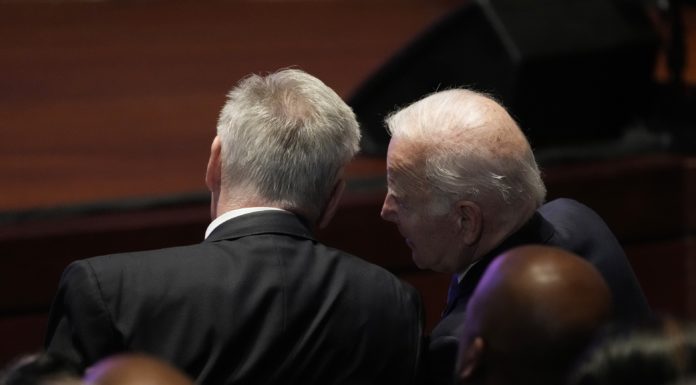(Headline USA) House Speaker Kevin McCarthy, R-Calif., and President Joe Biden reached an “agreement in principle” to raise the nation’s legal debt ceiling, but now Congress must rush to approve the spending cuts package in a matter of days to avert a potentially disastrous U.S. default.
The agreement risks angering both Democratic and Republican sides as lawmakers Sunday begin to unpack the the concessions made to compromise.
Heard the call. RINOs congratulating McCarthy for getting almost zippo in exchange for $4T debt ceiling hike was enough to make you 🤮.
(Actually, it’s so bad they won’t give a figure for the debt ceiling hike … only that it’s suspended til Q1 2025. Our bill was a year less.)
— Rep. Dan Bishop (@RepDanBishop) May 28, 2023
Negotiators agreed to some Republican demands for increased work requirements for recipients of food stamps that had sparked an uproar from House Democrats as a nonstarter. But they stopped short of greater spending cuts overall that Republicans wanted.
Support from both parties will be needed to win congressional approval before a projected June 5 government default on U.S. debts.
McCarthy in brief remarks at the Capitol said that “we still have a lot of work to do.”
But the Republican speaker said: “I believe this is an agreement in principle that’s worthy of the American people.”
The Republican speaker and Democrat president reached the agreement after the two spoke Saturday evening by phone.
“The agreement represents a compromise, which means not everyone gets what they want,” Biden said in a statement late Saturday night. “That’s the responsibility of governing,” he said.
Biden called the agreement “good news for the American people, because it prevents what could have been a catastrophic default and would have led to an economic recession, retirement accounts devastated, and millions of jobs lost.”
However, some fact checkers have noted that this situation may not be as dire as Democrats have sought to portray it in the media in their bid to hijack the negotiation process.
Were the country to surpass the debt ceiling and be forced to cease any extra spending, it would first be obligated to pay its debtors before any discretionary spending. It is also likely that the two sides would find a quick fix to keep essential services, such as social security, in place, as has been the case in previous government shutdowns.
Moreover, the situation is not unprecedented, with the U.S. having defaulted at least three times previously, the last one being in 1979, according to an Axios fact check.
With the outlines of a deal in place, the legislative package could be drafted and shared with lawmakers in time for House votes as soon as Wednesday, and later next week in the Senate.
Central to the package is a two-year budget deal that would hold spending flat for 2024 and increase it by 1% for 2025 in exchange for raising the debt limit for two years, pushing the volatile political issue past the next presidential election.
Driving hard for a deal to impose tougher work requirements on government aid recipients, Republicans achieved some but not all of what they wanted. The agreement would raise the age for existing work requirements on able-bodied adults without children from 49 to 54, but Biden was able to secure waivers for veterans and the homeless.
The two sides had also reached for an ambitious overhaul of federal permitting to ease development of energy projects. Instead, the agreement would put in place changes in the landmark 1970s’ National Environmental Policy Act that will designate “a single lead agency” to develop environmental reviews, in hopes of streamlining the process.
The deal came together after Treasury Secretary Janet Yellen told Congress that the United States could default on its debt obligations by June 5—four days later than previously estimated—if lawmakers did not act in time.
Lifting he nation’s debt limit, now at $31 trillion, allows more borrowing to pay the nation’s already incurred bills although the Biden administration has expressed little interest in doing so.
After COVID spending sent the deficit skyrocketing, Biden, with a Democrat-led Congress, proceeded to pass even more multi-trillion-dollar packages that directed funds to historical leftist donors, such as labor unions and green-energy developers.
He also has sent an estimated $150 billion, at least, to fund a war in Ukraine that many believe is being rerouted into his offshore retirement fund by way of the energy company Burisma and other investments in bioweapons development through family members including his son Hunter.
Biden spoke earlier in the day with Democrat leaders in Congress to discuss the status of the talks. White House officials planned to brief House Democrats on a Sunday video call.
Many of the fiscally conservative Republicans in Congress have long been skeptical of the Treasury’s projections, and they are pressing McCarthy to hold out.
Both sides have suggested one of the main holdups was a GOP effort to expand work requirements for recipients of food stamps and other federal aid programs, a longtime Republican goal that Democrats have strenuously opposed.
Biden has said the work requirements for Medicaid would be a nonstarter. He had seemed potentially open to negotiating changes on food stamps, now known as the Supplemental Nutrition Assistance Program, or SNAP, despite objections from rank-and-file Democrats.
Lawmakers are not expected to return to work from the Memorial Day weekend before Tuesday, at the earliest, and McCarthy has promised lawmakers he will abide by the rule to post any bill for 72 hours before voting.
Adapted from reporting by the Associated Press

